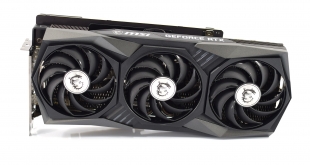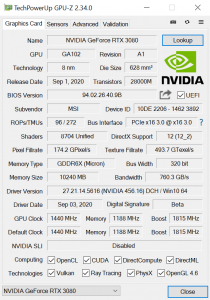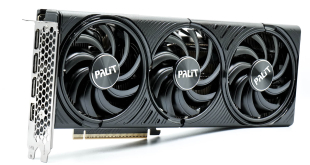
Barely any time has passed since we got our first look at just how fast the RTX 3080 really is, but today we are finding out whether it can go even faster. That's because we are looking at MSI's RTX 3080 Gaming X Trio, a huge graphics card with a triple-fan cooler, that also ships with a factory overclock of over 100MHz. It's certainly not cheap at £759.99, but if you want the best of the best, is this the card to buy?
MSI's Gaming X Trio has always been a premium offering, and that is certainly the case with this RTX 3080 model, as it is priced almost £110 more than the RTX 3080's £649 MSRP. For that extra cash, MSI promises increased performance, lower noise levels and lower temperatures, while also offering plentiful RGB lighting for those looking for some bling.
Here, we find out just how much faster this card is up against Nvidia's Founders Edition, and whether or not the large cooler can yield significantly improved thermals and acoustics.
| GPU | RTX 3090 | RTX 3080 | RTX 2080 Ti (FE) | RTX 2080 SUPER | RTX 2080 (FE) |
| SMs | 82 | 68 | 68 | 48 | 46 |
| CUDA Cores | 10496 | 8704 | 4352 | 3072 | 2944 |
| Tensor Cores | 328 | 272 | 544 | 384 | 368 |
| RT Cores | 82 | 68 | 68 | 48 | 46 |
| Texture Units | 328 | 272 | 272 | 192 | 184 |
| ROPs | 112 | 96 | 88 | 64 | 64 |
| GPU Boost Clock | 1695 MHz | 1710 MHz | 1635 MHz | 1815 MHz | 1800 MHz |
| Memory Data Rate | 19.5 Gbps | 19 Gbps | 14 Gbps | 15.5 Gbps | 14 Gbps |
| Total Video Memory | 24GB GDDR6X | 10GB GDDR6X | 11GB GDDR6 | 8GB GDDR6 | 8GB GDDR6 |
| Memory Interface | 384-bit | 320-bit | 352-bit | 256-bit | 256-bit |
| Memory Bandwidth | 936 GB/Sec | 760 GB/Sec | 616 GB/sec | 496.1 GB/sec | 448 GB/sec |
| TGP | 350W | 320W | 260W | 250W | 225W |
Just before diving into the details, it's worth reminding ourselves of the key specs for the RTX 3080. Built on Nvidia's GA102 GPU, fabricated on Samsung's 8nm process, RTX 3080 houses 8704 CUDA cores, 68 RT Cores and 272 Tensor cores.
A reference board would come clocked at 1710MHz, but this is the MSI Gaming X Trio, so of course it has a relatively hefty factory overclock, with a rated boost of 1815MHz. We do, of course, expect GPU Boost to bring actual frequency well above those levels, but we will look at that later in the review.
The 10GB VRAM is provided thanks to Micron's new GDDR6X memory. Operating at 19Gbps, over a 320-bit bus this gives total memory bandwidth of 760GB/s.
All of those cores, fast memory and factory overclock come at a cost, however, and that is power draw. Reference TGP for a RTX 3080 is 320W, but MSI has bumped this up to 340W, making it one of the most power-hungry GPUs I have ever tested.
 KitGuru KitGuru.net – Tech News | Hardware News | Hardware Reviews | IOS | Mobile | Gaming | Graphics Cards
KitGuru KitGuru.net – Tech News | Hardware News | Hardware Reviews | IOS | Mobile | Gaming | Graphics Cards



